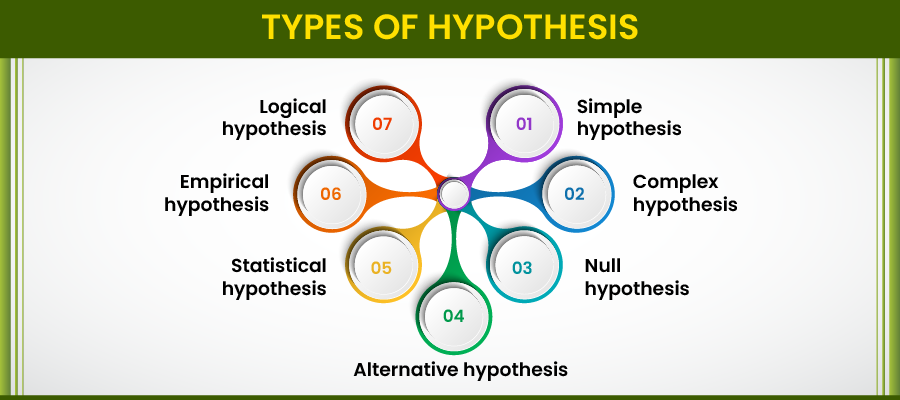 Offers
New
Order Now
Offers
New
Order Now
Have you ever come across the question of what is a hypothesis? It states your predictions about what your research will uncover. In this guide, we will discuss what is a hypothesis, its importance, types, and tips. We will also explore some of its key features and how it is structured. So, without any further delay, keep reading this blog till the end for a better understanding.
A hypothesis is considered an assumption or a statement that sets the connection between two or more variables involved in our research. It refers to a prediction or preliminary answer to the query statement that is yet to be tested and analysed for further investigation. In simple words, it is more than an educated guess; it is a predictive assertion that offers an explanation for a real-world event or phenomenon. Let's see one of the best hypothesis examples:
Now we know what is the research hypothesis. In the next section, we will discuss its importance in research. What are you waiting for? Scroll below to know more!
A research hypothesis is a vital element of the scientific method. Below are some points mentioned that can help you get a better understanding.
These were some points that will help you identify the area that should be focused on to solve the research query. Moving forward, let's go through various types of Hypothesis.
Depending on the nature of your investigation and what you hope to discover, a hypothesis consists of 7 main categories. Now, let's explore it's different types and Hypothesis examples that can help you answer various kinds of research questions.

It is a type of Hypothesis that only suggests the relationship between two variables, where one is independent & the other is dependent.
For example:
1. Regular exercise improves mental health in womens.
2. People feel happier in rooms painted pink as compared to rooms painted grey.
It is a type of Hypothesis that promotes a connection between more than two variables: two independent and one dependent.
For example:
1. Sunny weather can improve mood, but the influence is stronger in people who enjoy outdoor activities
2. Regular exercise improves mood, especially in people who have protective social networks.
It is a type of Hypothesis that advances the idea that there is no connection between variables.
For example:
1. An individual's diet has no effect on their skin health.
2. The size of a work team has no impact on overall efficiency.
It is a type of Hypothesis that contradicts the null Hypothesis; only one of them must be true.
For example:
1. Regular exercise leads to more weight loss than an inactive lifestyle.
2. Listening to music while working improves focus.
It is a type of Hypothesis that suggests the connection between variables without gathering data.
For example:
1. If people drink excessive water, then they will feel more hydrated.
2. If people eat a healthy diet, then they will maintain a healthy weight.
It is also known as a working hypothesis. Unlike logical hypotheses, empirical hypotheses are supported by actual evidence or data.
For example:
1. By washing your hands every hour, you can lower your risk of getting sick.
2. Teenagers who spend more than 3 hours on social media each day report higher levels of anxiety.
It is a type of Hypothesis that assess a typical population sample using stats analysis, then calculates the results for the broader population.
For example:
1. The average weight loss of people who exercise 30 minutes a day is greater than 0.
2. The average learning outcome of students in a well-lit classroom is higher than that in dimly lit classrooms.
So these were the various types of Hypothesis. Now it's time to dive straight into some of its key features.
Hypothesis must meet specific criteria to ensure scientific rigor and validity in research investigations. Here are some key features of Hypothesis mentioned.
1. Clear and Concise: A hypothesis should state what is known and what is expected from you to find. Also, address a key knowledge gap in a certain field of study.
2. Structure: It must include all the elements that make a hypothesis, which involves variables, outcomes and relationships.
3. Positive: A hypothesis should assume an association exists, using positive language. Here, proper phrasing is key to ensuring clarity and focus.
4. Logical: One of the other features of hypothesis is that it should be logical and based on past theories, observations and prior research.
5. Falsifiable: It should be feasible to gather information that disproves the Hypothesis instead of confirming it.
6. Testable: Make sure the Hypothesis enables you to strive for measurable and testable outcomes.
7. Brevity & Objectivity: Don't be overly wordy while presenting your Hypothesis.
The above-mentioned features of Hypothesis will give you a fair idea about guiding your research and ensuring that your research is focused. However, if you still feel unsure or struggling to understand these tips, feel free to get thesis help from professionals who are eager to help you.
Well, as you are aware, a hypothesis structure provides a testable prediction and defines the connection between variables. In this section of the blog, we will discuss how it is structured.
To create a hypothesis, start with a clear and concise research question. Moreover, it should be certain, focused and feasible to explore within the limit of your project.
Your answer should be based on existing research and theories to form informed assumptions. Furthermore, create a conceptual framework to explain appropriate variables and their relationships.
In this step, you should have a clear idea of your expected findings. Moreover, write your initial answer to the research question in a concise and clear sentence that figures your prediction.
Ensure that your Hypothesis is certain and testable, with clearly defined terms. Also, it should include relevant variables, the group being studied, and a clear prediction of the expected result of the experiment.
To recognise variables, frame your Hypothesis in an "if...then" format. This shows the independent and dependent variables. Yet, it can also express correlations or expected differences between groups, like comparing lecture attendance and grades.
These components of a hypothesis can help you in providing a clear framework for your analysis. Also, ensure that your experiments are focused and well-organised. Next, we will explore various tips to write a research hypothesis
Below are some of the tips that can enable you to write a hypothesis for your analysis. Scroll below to expand your knowledge.
These tips can help you in developing a hypothesis. Also, they will guide you to formulate a Hypothesis that is not only scientifically sound but also clear for testing.
A strong hypothesis serves as the cornerstone of any research, providing a clear pathway for testing and analysis. Coming up with a well-formed hypothesis can be difficult if you are working on research and assignments. Here, expert services like Global Assignment Help Australia can help you craft precise hypotheses. They will not only help you in your research but also write your assignment in no time!
You May Also Like To Read :
How to Write a Speech: Helpful Tips to Engage Your Audience
How to Write a Character Analysis? Types, Example and Tips
What Are Writing Conventions? An Effective Checklist for Students

Grab this exclusive offer and start your journey to savings today! Act quickly, as this special offer won't be around for long!

This blog explains what is a hyperbole, provides engaging examples, & explores how to use hyperbole.

Explore 150+ funny debate topics to spark laughter, creativity, and lively discussions in 2025

Cross-Sectional Study basics explained with steps, examples, and comparisons.
1.How to Conclude a Research Hypothesis Effectively?
2.What Is the Difference Between ‘Hypothesis’ and ‘Hypotheses’?
3.What Is a Research Hypothesis?
4.What Are the 5 Characteristics of a Good Hypothesis?
Limited Time Offer
Exclusive Library Membership + FREE Wallet Balance
1 Month Access !
5000 Student Samples
+10,000 Answers by Experts
Get $300 Now
Update your Number

